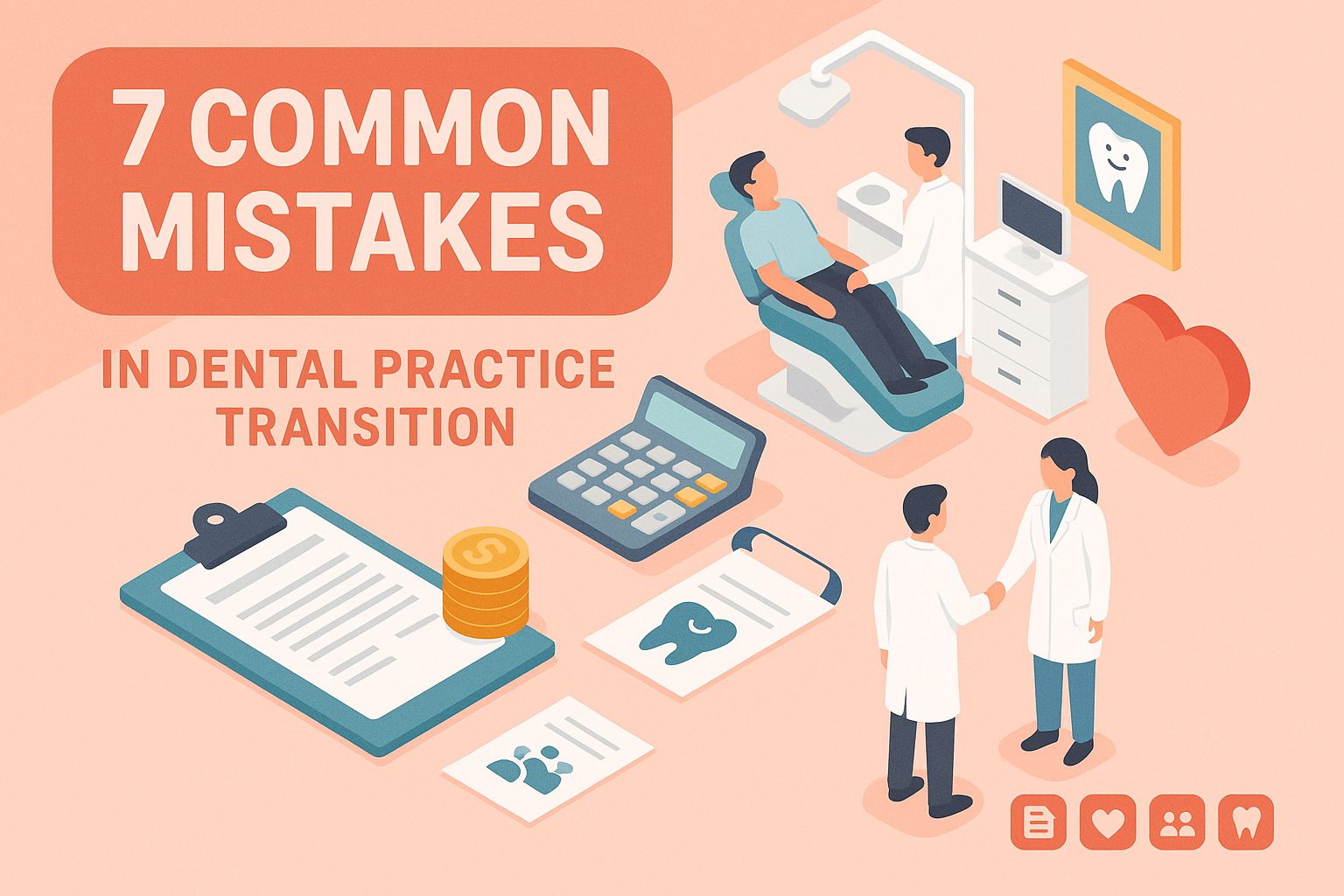Common Mistakes to Avoid When Selling Your Dental Practice

Selling your dental practice marks an important professional milestone. Whether you're pursuing retirement, a career pivot, or relocating outside of Ontario, transitioning out of your practice in the Greater Toronto Area (GTA) involves strategic and financial considerations far beyond simply listing your clinic for sale. Avoiding common pitfalls is crucial to preserving value and ensuring a smooth changeover. This guide highlights seven primary missteps often encountered by GTA practitioners and offers strategies for a successful sale that supports both practice continuity and financial outcomes.
1. Poor Timing Can Undercut Your Practice Value

Timing plays a pivotal role in maximizing your dental practice’s sale price. Unfortunately, many clinicians underestimate how long a successful transition takes. Ideally, preparing your practice for sale should begin at least three to five years ahead. This window allows the clinic to stabilize or increase collections, reduce overhead, and streamline operations — all of which are key indicators for potential buyers.
In the GTA, practices with over $1 million in annual collections command high buyer interest. Yet many experience a last-minute dip in revenue due to burnout or operational distraction, ultimately lowering market value. Planning early helps ensure you don’t leave money on the table.
2. Trying to Sell Without Expert Guidance

Some dentists attempt to handle the sale process independently to avoid broker fees. However, this DIY approach often opens the door to mispricing, poor buyer screening, and overlooked legal or tax obligations. Working with a qualified dental practice broker in Toronto can help:
- Accurately appraise your practice based on EBITDA, goodwill, and market comparables
- Select the right marketing channel to reach targeted local buyers
- Structure contracts and due diligence to meet Canadian legal norms
Professional dental transaction advisors offer localized insight into GTA buyer expectations and often maintain buyer networks already looking for practices in your demographic or specialty type.
3. Not Organizing Financial and Operational Records

Incomplete or disorganized financial records raise red flags for prospective buyers. Neglecting this area can prolong due diligence or lead buyers to discount your valuation. At minimum, sellers should have the following readily available before negotiations begin:
- Three years of tax returns and annual financials
- Monthly production and collection reports
- Staff employment agreements and compensation structure
- Current lease agreements and clinic floor plan
Implementing practice management software aligned with EBIKO Dental’s solutions ensures accuracy and ease of sharing. Using digital reporting tools streamlines buyer analysis and enhances confidence during review.
4. Overvaluing the Practice Based on Emotion

Clinics are inherently personal investments, making it easy for selling dentists to overvalue them emotionally. However, the fair market value is determined by data: current financial performance, patient distribution, staff retention, and growth opportunity. Emotional pricing often delays a sale or results in costly price reductions down the line.
Securing a data-driven valuation from a third-party advisor helps determine a realistic price point. Toronto’s dental market is competitive, and grounded pricing opens your options to more qualified buyers, structuring a deal that meets both transition and financial needs.
5. Failing to Maintain Production During Transition

Once the decision to sell is made, many dentists begin to mentally disengage from their office. However, a noticeable decline in patient flow, reduced diagnostic treatment, or lower collections near the time of sale can negatively affect buyer interest and practice valuation.
Continuing to invest in staff training, dental supplies, and digital diagnostics from trusted vendors like EBIKO Dental helps keep efficiency and revenue high. Consider implementing short-term patient nurture campaigns or updated hygiene recall programs to sustain inflow while in transition.
6. Ignoring the Associate and Staff Transition Plan

Dental office staff play a central role in maintaining goodwill with patients. Buyers often assess team longevity and skill level during due diligence. If your team appears uninformed or uncertain about the practice’s future, the likelihood of issues post-sale increases.
To counteract this, maintain transparency. Work with your broker or HR consultant to craft a retention plan for key staff and associates. This may include bonus structures, vacation continuation, or phased handovers. A confident and informed staff encourages buyers that the clinic will continue functioning smoothly under new leadership.
7. Choose the Right Partner for Your Practice Sale

Navigating a practice sale is intricate, covering valuation, branding, negotiations, employment law, equipment inventory, and patient trust continuity. Partner with professionals who not only understand the nuances of the sale process but who also offer a full suite of transition support tailored to Ontario’s standards and marketplace.
Consider engaging with a consultant who collaborates with supply providers like EBIKO Dental, ensuring you receive coordinated support that covers operational efficiencies right up until the final patient handoff. Whether you’re selling a family-focused GP clinic or a multi-specialty facility, localized market mastery is vital to protecting your lifetime investment.

